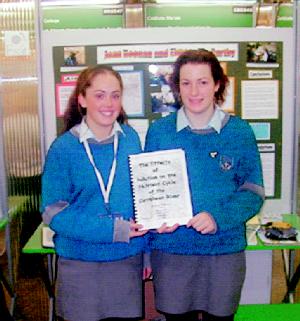| 2002 |

|
YEAR BOOK |
COL�ISTE CHOILM, BALLINCOLLIG, CO. CORK
|
The effects of pollution on the nutrient cycle of the
Curaheen River
|

We then began to test the water and the invertebrates, so we could assign a level of pollution to each stage of the river. We did this by completing nitrate, phosphate and pH tests on the water and taking �kick samples� from the riverbed. We identified all the invertebrates using freshwater keys and books, and compared the three sites. We found that, although there was no significant difference in the water samples, there was in the invertebrates found in the riverbed.
From this we were able to assign a �Q� value to the three stages, determining how polluted each one was. As we expected, the stage nearest the source was the least polluted and the final stage was severely polluted.
But we still didn't know if this pollution was affecting the way in which a river decomposes matter and energy � i.e. the nutrient cycle of the river. And so we set out to answer this question. We made leaf packs from netting of two different sizes: one had tiny holes to allow for micro-invertebrates such as bacteria and fungi to decompose, and the other had large holes to allow for macro-invertebrates to decompose. We then placed 15g of Alder leaves in each pack and buried them under a riffle in riverbed.
We had 72 packs in all, and removed three of each size netting, from each site, every week. We then removed all the pieces of leaves from the netting and reweighed them in the lab.
After we analysed our results, it could be seen that there was a really significant difference in the rate of decomposition between the sites. In Stage 1, where the water was fairly unpolluted, the decomposition occurred much faster, compared to the other more polluted sites. And so we came to the conclusion that pollution does affect the nutrient cycle of the river. This is very important as we can now say that pollution slows down the whole ecosystem in a river and prevents it from recycling and processing its energy.
Eimear McCarthy & Jean Noonan won Second Prize in the Senior Group Section in the Biological and Ecological Sciences Category at the Esat Young Scientist and Technology Exhibition in January 2002. They also won a Special Award presented by the Environmental Protection Agency.
Their teacher was Ms Joan Faherty.
|
|